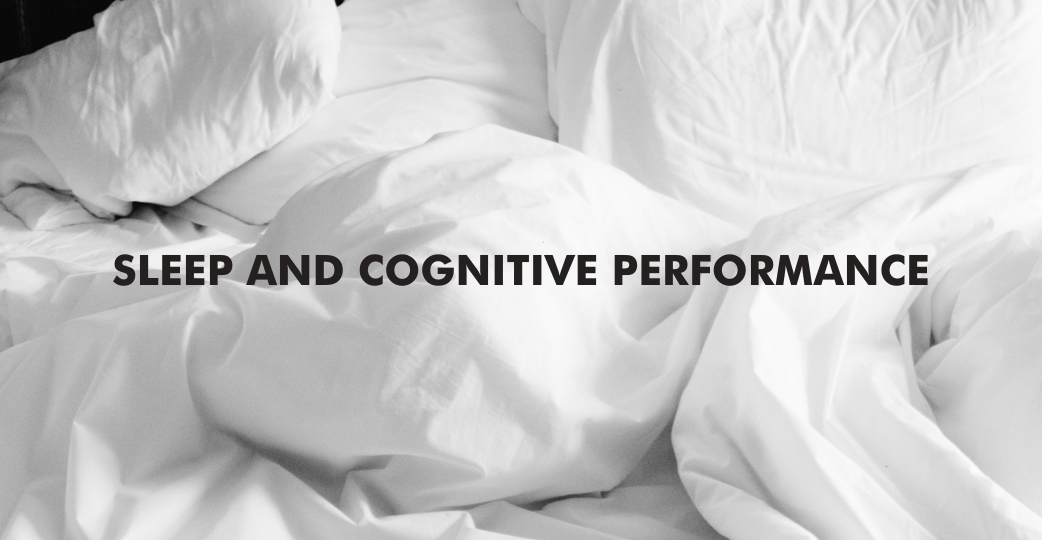
Sleep and cognitive performance are vital if you want sustainable high performance.
The brain undergoes significant changes during sleep, with activity levels varying across stages, such as rapid eye movement (REM) and non-REM (NREM) sleep. Emerging evidence highlights the role of sleep in enhancing various aspects of cognitive function, making it a crucial time for the brain.
Adequate and high-quality sleep is essential for concentration, and attention is vital for effective learning. In addition, sleep supports multiple cognitive functions such as memory, problem-solving, creativity, emotional processing, and judgment.
Sleep deprivation, insomnia, sleep apnea, and other conditions that disrupt sleep can lead to short-term cognitive impairment during the day. In addition, sleep supports sustainable performance, which is vital in business.
What Happens to the Brain During Sleep?
Throughout a typical night of sleep, an individual experiences four to six sleep cycles, each lasting between 70 and 120 minutes. This is the main reason why everyone points to the idea of getting 7-9 hours of sleep per night. These cycles are characterised by distinct brain and body changes corresponding to specific sleep stages.
During NREM stages, brain activity generally slows down, although specific pulses of brain waves persist. The most pronounced pattern of brain waves occurs during stage 3 NREM sleep, also known as slow-wave sleep or deep sleep.
On the other hand, REM sleep is characterised by a significant increase in brain activity. In many ways, the brain’s activity during REM sleep is similar to being awake, which results in more vivid dreams.
NREM and REM stages are cycled through typically, with REM sleep being more prominent in the latter half of the night. Therefore, if you lack sleep, you will be lacking in mostly REM sleep.
During each phase of this process, different chemicals in the brain become activated or deactivated to coordinate rest and recovery.
While experts are not entirely sure why sleep occurs in this pattern, it is believed to facilitate mental recovery, leading to cognitive benefits related to attention, thinking, and memory.
How Does Poor Sleep AFFECT the Brain?
The brain’s ability to function effectively is compromised without adequate sleep. Neurons become overworked and incapable of optimal performance in various types of thinking, as they do not have sufficient time to recover.
Poor sleep can manifest in several forms, such as insufficient sleep duration or fragmented sleep. Both types of poor sleep make it challenging to progress through sleep cycles in a usual, healthy manner, leading to difficulty with clear thinking and processing information after a restless night.
While the short-term effects of poor sleep on the brain and cognition may result from a single night of sleep deprivation, those who experience chronic sleep issues may encounter continuous negative impacts on daily tasks. In the long term, poor sleep may increase the risk of cognitive decline and dementia.
What Are the Short-Term Impacts of Poor Sleep on Cognitive Performance?
The effects of sleep on cognitive function can vary widely, particularly in the short term. Most people are familiar with the fatigue and drowsiness resulting from a night of poor sleep, leading to microsleeps and severe cognitive impairments during waking hours. Research has found that the effects of insufficient or disrupted sleep can be similar to those experienced when drunk, slowing down reaction time and thinking. Think about that, how well do you think you can perform when drunk?
Poor sleep can specifically impact various cognitive functions, including attention, learning, processing, and emotional regulation. Insufficient or disrupted sleep can even harm certain areas of the brain that are responsible for cognition. While studies on the effects of sleep on cognition do not always yield consistent results, there is scientific consensus on some of how poor sleep may impair academic performance.
For example, poor sleep can reduce place-keeping abilities, impair cognitive flexibility, and alter emotional processing. It can also lead to risky decision-making and make it difficult to learn from mistakes. These factors can impact academic and professional achievement, creative pursuits, and productivity. Additionally, the cognitive effects of poor sleep can create health risks, such as drowsy driving or operating heavy machinery without adequate sleep. In short, quality sleep is crucial for optimal cognitive function and overall well-being.
What Are the Long-Term Impacts of Poor Sleep and cognitive Performance?
Growing evidence suggests that sleep has immediate and long-term effects on cognitive function, including memory and the risk of developing memory issues, cognitive decline, and dementia.
Studies have shown that both non-rapid eye movement (NREM) and rapid eye movement (REM) sleep are essential for memory consolidation. NREM sleep is associated with declarative memory formation, such as basic facts or statistics. In contrast, REM sleep is believed to boost procedural memory, like remembering a sequence of steps.
Poor sleep disrupts the normal process of memory consolidation by affecting both NREM and REM sleep, impairing the brain’s ability to build and retain memories. Sleep-deprived individuals have also been found to be at risk of forming false memories, and fragmented sleep can negatively impact memory, even if the person gets adequate sleep.
Observational studies have shown a higher risk of cognitive impairment and Alzheimer’s disease in people with sleep problems. Sleep is crucial for clearing out potentially dangerous substances.
Insufficient sleep and sleep fragmentation have been linked to cognitive decline and dementia, possibly due to the accumulation of beta-amyloid proteins in the brain. In people already diagnosed with dementia, poor sleep has been associated with a worse disease prognosis.
How Does Poor Sleep Affect Creativity and Other Cognitive Processes?
Sleep problems can also impact creativity, which relies on connecting loosely associated ideas. Good sleep strengthens this ability, as NREM sleep allows information to be restructured, and REM sleep often leads to new ideas and links between thoughts. These processes facilitate insight, a key element of innovative and creative problem-solving.
Moreover, limited or restless sleep can indirectly affect cognition through other related problems. For instance, migraine sufferers are more likely to experience morning headache attacks when they do not get adequate sleep. Lack of sleep also increases the risk of infections, such as the common cold. Additionally, sleep deprivation may exacerbate symptoms of mental health conditions like anxiety and depression. Sleep quality plays a significant role in numerous physical and mental health issues, which can affect a person’s attention and concentration.
Are the Impacts of Poor Sleep on Thinking the Same For Everyone?
The impact of poor sleep on cognition varies from person to person. Genetics may play a role in determining who is more vulnerable to cognitive impairment due to lack of sleep. Moreover, research shows that adults are more resilient to sleep deprivation’s effects than teenagers, whose developing brains are more susceptible to impaired thinking, decision-making, and academic performance. Additionally, studies suggest that women cope better with sleep deprivation than men. However, the reasons for this still need to be fully understood and may be influenced by biological, social, or cultural factors.
Will Improving Sleep Benefits Cognition?
Improving sleep can be a practical way for individuals with sleeping problems to enhance their cognitive performance. By obtaining the recommended amount of uninterrupted sleep, the brain can recover and avoid the negative consequences of poor sleep on various aspects of thinking.
Public health experts and researchers increasingly recognise the potential of good sleep as a preventive measure against dementia and Alzheimer’s disease. While further research is required to establish sleep’s precise role in preventing cognitive decline, initial studies suggest that improving sleep may decrease the likelihood of developing Alzheimer’s disease over the long term.
Ways To Improve Sleep and Cognitive Performance
It is essential to consult a doctor or sleep expert to improve cognitive impairment or excessive daytime sleepiness. A medical professional can identify any underlying conditions or sleep disorders that may be causing these symptoms and recommend strategies for better sleep. Improving sleep hygiene is often the first step towards better sleep. Here are seven ways to support this.
- Stick to a consistent sleep schedule: Go to bed and wake up at the same time every day, even on weekends. This helps regulate your body’s clock and promotes better sleep.
- Create a sleep-conducive environment: Make sure your bedroom is cool, quiet, and dark. Use comfortable pillows and a supportive mattress, and consider using white noise or earplugs to block out any distractions.
- Avoid stimulating activities before bedtime: Limit exposure to screens (TV, phone, computer) for at least an hour before bedtime. Avoid vigorous exercise, heavy meals, and caffeine or alcohol within several hours of bedtime.
- Establish a relaxing bedtime routine: Wind down with calming activities like reading a book, taking a bath, or practising meditation or yoga.
- Manage stress: Stress and anxiety can make falling and staying asleep difficult. Try relaxation techniques such as deep breathing or progressive muscle relaxation, or talk to a mental health professional if you need additional support.
- Get regular exercise: Physical activity can help promote better sleep, but it’s best to avoid exercising too close to bedtime as it can be stimulating.
- Be mindful of what you eat and drink: Avoid heavy meals and spicy or acidic foods close to bedtime, and limit your fluid intake in the evening to reduce the need to get up to use the bathroom at night.
By taking steps to get enough sleep, you can give your mind the rest it needs to function optimally. Regularly sleeping for seven to nine hours each night is an essential part of maintaining cognitive health and should be a priority for all individuals.
If you found this interesting, why not take our peak performance test to see how you are doing in this area and the other areas of foundational health?
